SC invalidates QC ordinance that deprived Manila Seedling Bank of property

The Supreme Court (SC) on Thursday announced that it has invalidated a Quezon City ordinance that reclassified a property used by the Manila Seedling Bank Foundation, which effectively deprived the foundation of its use.
In a decision dated July 30, the Supreme Court En Banc found the QC ordinance to be ultra vires or beyond the local government unit’s (LGU) scope of authority to issue.
Located at the corner of EDSA and Quezon Avenue, the seven-hectare Manila Seedling Bank compound was closed down by the Quezon City government in 2013. The LGU also evicted its tenants, claiming they were operating without business permits.
When sought for comment, the QC LGU said that though it has yet to receive a copy, it fully acknowledges the decision of the court.
“We remain fully committed to ensuring that our local policies and legislation, whether past or present, adhere to the proper legal principles and serve the best interests of our people,” it said in a statement
“We will closely monitor the decision and its directives, and have our legal office evaluate our appropriate actions in accordance [with] the same,” it added.
The LGU in 2003 enacted the Amended Quezon City Ordinance, which reclassified the foundation’s property into Metropolitan Commercial Zone and a portion of it into an Institutional Zone.
In 2012, the court said the local government did not issue a locational clearance to the foundation, and it was unable to renew its business permit.
The foundation then filed a petition for prohibition against the city.
A regional trial court (RTC) later ordered the LGU to stop enforcing the ordinance on the property and to issue the foundation a clearance and business permit.
The LGU, however, foreclosed and sold the property for the Foundation’s non-payment of real property tax.
Though the foundation petitioned for prohibition and injunction, the RTC dismissed the petition, a ruling that was later affirmed by the Court of Appeals.
This led to the present petitions before the SC.
According to the SC, the LGU lacked the authority to reclassify the property for a use different from the intention intended by Proclamation No. 1670, a national law.
The SC said that the proclamation granted the foundation usufructuary rights over the seven-property, which was owned by the National Housing Authority (NHA).
“Local ordinances cannot amend a national law,” the High Court said.
The Court also ruled that the LGU cannot foreclose and seize the property for non-payment of real property tax as it was owned by the NHA, which was a tax-exempt institution.
The LGU, however, may claim its tax by directly assessing the foundation as the exemption does not extend to the beneficial users of NHA’s properties.
“As the City wrongly foreclosed the property, the Foundation may file the proper case against the City,” the SC said in a statement.—RF/KBK, GMA Integrated News




